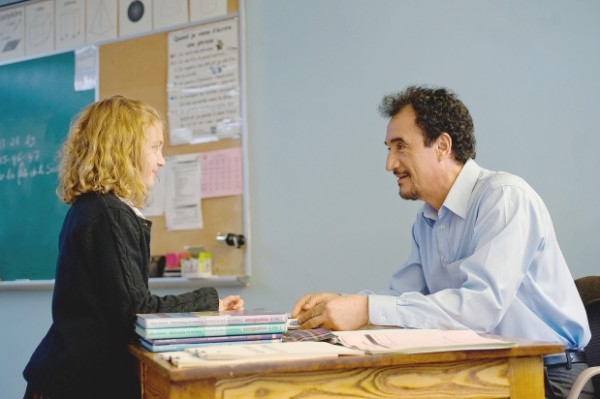
Set in a Montreal school, director Philippe Falardeau’s Monsieur Lazhar tells the story of the titular Bachir Lazhar (Mohamed Fellag), an Algerian immigrant to Quebec. Lazhar becomes the new teacher to a class of 11-12 year olds after their previous teacher committed suicide in their classroom, a suicide discovered by two of her pupils. Monsieur Lazhar comes into their lives carrying his own traumatic story and an outsiders view of teaching and his new country to witness the private school’s struggle to come to terms with the sudden loss of their teacher and colleague.
The stageplay origins of Monsieur Lazhar never come through in Falardeau’s film though he adapted his script from the play by Evelyne de la Chenelière. Instead, using positive elements of a near pseudo-documentary style, the director keeps a polite observatory distance from the characters, in which we observe children and adults alike attempt to wrangle with their feelings around death and loss. Lazhar losing his country is just an inkling of the full extent of loss he has experienced in his life. However, when he quickly applies for the teaching position and just as quickly is employed, he never brings his own story into the classroom.
The children are painfully aware of what has happened to make Lazhar their new teacher and deal with it in their own way; some are angry and wish to allocate blame to others for their former teacher’s death. As a social outsider, Lazhar’s questioning of the status quo within the school makes the audience consider a ‘normal’ or ‘appropriate’ approach to such a traumatic event in the culture of a school. When Mrs. Vaillancourt (Danielle Proulx) attempts to explain the school’s cultural and statutory rules to Lazhar, his surprise and puzzlement allows for the audience to reconsider social and emotional mechanics that the school (culture) has developed.
The performances by the child actors avoid any slide toward a Disney-esque simplification of a child’s reactions. Alice (Sophie Nélisse) and Simon (Émilien Néron), having seen the body of their former teacher, both try to cope with the issue of death whilst continuing to be within the environment of a school whose adults are attempting to swiftly move on from the same death. Through his love of the correct use of the French language, Lazhar gives space and time to all of his pupils to express how they feel, becoming the one adult that allows them the opportunity to express their feelings without involving his own.
The film has a gentle approach to the major subjects of death and loss and is filled with social commentary that is not portrayed in a dogmatic way. Instead, Monsieur Lazhar offers the audience the perspective of a man looking at his surroundings with compassion and fresh, though experienced, eyes.

Mairéad has awarded Monsieur Lazhar three torches of truth.













